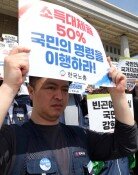Inspiration

Born to a poor toffee seller, Dr. Seo Jin-kyu left for America as a maid at the age of twenty-two with 100 dollars in her pocket. Raising her daughter as a single mother at the age of thirty, she entered the US Army, and at the age of 42 she entered Harvard University for master course and finally obtained her doctorate degree at 58.
She never surrendered to the hardships of life. Whenever faced with difficulties, she said to herself over and over again, I have to get back on track. I cant fail. Because no one around her could tell her this she had to learn how to love and cherish herself. By placing the lines of a poem by Moon Jung-hee close to her heart, she revived the hope and passion of life.
Wake the wolf, the fire of passion which lives deep within your heart!
Star Communications CEO Joanne Lee fell in love with her teacher at the age of twenty-three and married against the will of her society. When she acquired success at work she was surprised that after a short-lived joy she faced emptiness and a greater desire, and with the sudden death of her husband she was struck with grief. While living days of anguish, she decided one day to greet loneliness and solitude as it was. She was then surprised and thankful at the peace that she gradually came to feel. Life seems to be a series of myriad incidents, but in actuality it is the result of our decisions, big and small, our responses to these incidents.
I choose to become a happy person today! I dont sing because I am happy, but I am happy because I sing! (Andy Andrews The Travelers Gift)
This book contains the heartfelt poems and words of 28 people in a variety of fields within the culture industry. These are words that came to have a special value at the most difficult point in their lives. Their inspiration and emotion is evident in Emily Dickensons poem as follows.
If I can stop one heart from breaking/I shall not live in vain.../If I can ease one life the aching/or cool one pain, or help one fainting robin/ unto his nest again/I shall not live in vain.
While performing 19 and 80, the dramatist Park Jung-ja experienced in one of the characters, an 80 year old woman, the form of life that she truly wants to resemble and become in the future.
She is a saint, evidenced in the way in which she lives in an empty house and transfers a lonely tree in front of the city hall to the park, where nothing is hers but everything is her possession, a life of empty fulfillment. By responding to lifes little occurrences with wonder, she talks about the clear beauty of ordinary stones, trees, and nameless grasses.
People laugh and they cry. But the most important thing in life is not to be afraid of becoming human
When we are deprived in an instant by fate of the things that we perceived without question as our own, we tend to fall into great depression, as if to fall into an endless pitfall. Neither going forward or backward, we growl like a caged beast. But perhaps life is a process to lessen pain and create a nest for ourselves.
When Hwangjini, raised as a daughter of a noble household, discovered that she was from a lower class family and fell into the depths of despair, one monk advised her as thus:
This is the time to extract the poisoned arrow All pain has its limits, and beyond that is the truth, so feel your emotions until you can feel no longer. This is the true way to relate to pain. (Jun Gyung-rin Hwangjini)
Gi-U Lee keywoo@donga.com







